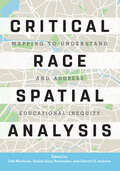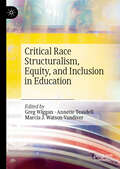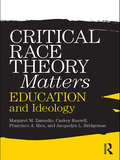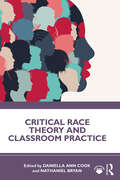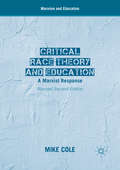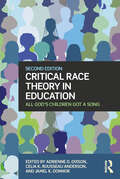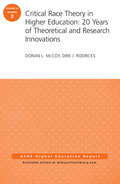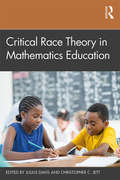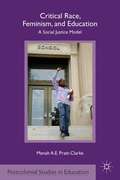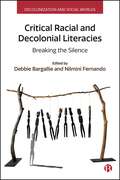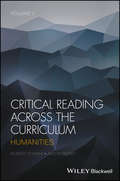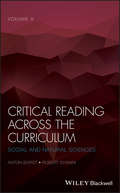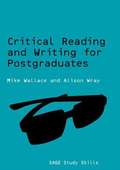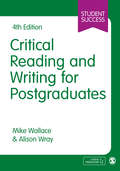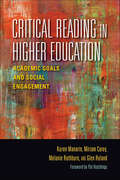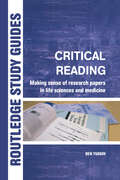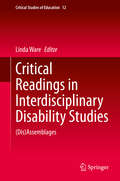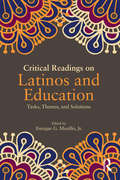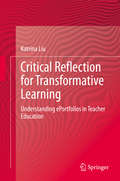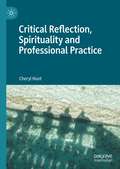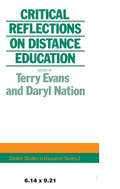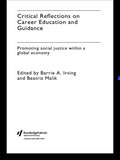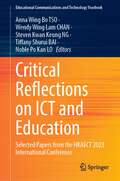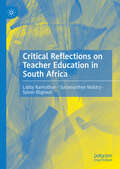- Table View
- List View
Critical Race Spatial Analysis: Mapping to Understand and Address Educational Inequity
by Darrell D. Jackson Subini Ancy Annamma Deb MorrisonHow does space illuminate educational inequity?Where and how can spatial analysis be used to disrupt educational inequity?Which tools are most appropriate for the spatial analysis of educational equity?This book addresses these questions and explores the use of critical spatial analysis to uncover the dimensions of entrenched and systemic racial inequities in educational settings and identify ways to redress them. The contributors to this book – some of whom are pioneering scholars of critical race spatial analysis theory and methodology – demonstrate the application of the theory and tools applied to specific locales, and in doing so illustrate how this spatial and temporal lens enriches traditional approaches to research. The opening macro-theoretical chapter lays the foundation for the book, rooting spatial analyses in critical commitments to studying injustice. Among the innovative methodological chapters included in this book is the re-conceptualization of mapping and space beyond the simple exploration of external spaces to considering internal geographies, highlighting how the privileged may differ in socio-spatial thinking from oppressed communities and what may be learned from both perspectives; data representations that allow the construction of varied narratives based on differences in positionality and historicity of perspectives; the application of redlining to the analysis of classroom interactions; the use of historical archives to uncover the process of marginalization; and the application of techniques such as the fotonovela and GIS to identify how spaces are defined and can be reimagined.The book demonstrates the analytical and communicative power of mapping and its potential for identifying and dismantling racial injustice in education. The editors conclude by drawing connections across sections, and elucidating the tensions and possibilities for future research.ContributorsBenjamin BlaisdellGraham S. GarlickLeigh Anna HidalgoMark C. HogrebeJoshua RadinskyDaniel G. SolórzanoWilliam F. TateVerónica N. VélezFederico R. Waitoller
Critical Race Structuralism, Equity, and Inclusion in Education
by Greg Wiggan Annette Teasdell Marcia J. Watson-VandiverThis volume presents Critical Race Structuralism as a framework for analyzing, explaining, and mitigating social and educational inequities. The book explores structural and systemic issues in schools with the aim of promoting greater DEI in education and beyond. With a focus on diversity and inclusion, it also addresses issues such as school policy, teacher pedagogy, curriculum design, and school leadership. The volume provides in-depth analyses of educational challenges to offer deeper conceptual understandings regarding how education can be used to heal and transcend inequities in schools, society, and beyond.
Critical Race Theory Matters: Education and Ideology
by Christopher Russell Margaret Zamudio Francisco Rios Jacquelyn L. BridgemanOver the past decade, Critical Race Theory (CRT) scholars in education have produced a significant body of work theorizing the impact of race and racism in education. Critical Race Theory Matters provides a comprehensive and accessible overview of this influential movement, shining its keen light on specific issues within education. Through clear and accessible language, the authors synthesize scholarship in the field, highlight major themes and assumptions, and examine strategies of resistance and practices for challenging the existing inequalities in education. By linking theory to everyday practices in today’s classroom, students will understand how CRT is relevant to a host of timely topics, from macro-policies such as Bilingual Education and Affirmative Action to micro-policies such as classroom management and curriculum. Moving beyond identifying problems into the realm of problem solving, Critical Race Theory Matters is a call to action to put into praxis a radical new vision of education in support of equality and social justice.
Critical Race Theory and Classroom Practice
by Nathaniel Bryan Daniella Ann CookThis edited book shows how critical race theory (CRT) can shape teacher practices in ways that improve educational outcomes for all children, especially those most marginalized in PreK-20 classrooms.The volume bridges the gap between the theoretical foundations of critical race theory and its application in formal and informal learning environments. To promote an active and interdisciplinary engagement of critical race praxis, it illuminates the pedagogical possibilities of using CRT while explicitly addressing grade span-specific content area standards and skills. Each chapter explores how educators use a critical race theory lens to deepen student learning, teach honestly about racism and white supremacy, and actively prepare learners to equitably participate in a multiracial democracy.Written for pre- and in-service teachers, teacher educators, and anti-racist community stakeholders, the text addresses the applicability of CRT as a pedagogical practice for PreK-20 educators seeking to meaningfully combat intersectional racial injustice and to create a more just democracy. This book is necessary reading for educators, and courses in Educational Foundations, Anti-Racist Education, Social Justice Education, Curriculum Studies, Educational Leadership, and Multicultural Education.
Critical Race Theory and Education: A Marxist Response (Marxism and Education)
by Mike ColeThis book, now in its second edition, focuses on the challenge to Marxism posed by Critical Race Theory as this relates to educational theory, policy, and practices with respect to both the US and UK. Critical Race Theory (CRT) in the realm of Education has a long history in the US, and is now a burgeoning field of inquiry in the UK. Critical Race Theory and Education is the first book-length response to CRT from a Marxist perspective and looks at CRT's origins in Critical Legal Studies, critiques the work of major US and UK Critical Race theorists, and also looks at some of CRT's strengths. CRT and Marxism are contextualized with respect to both neo-liberal global capitalism and imperialism and to anti-racist socialist developments in South America. The book concludes with some suggestions for classroom practice.
Critical Race Theory in Education: All God's Children Got a Song
by Adrienne D. Dixson, Celia K. Rousseau Anderson, and Jamel K. DonnorAppropriate for both students curious about Critical Race Theory (CRT) and established scholars, Critical Race Theory in Education is a valuable guide to how this theoretical lens can help better understand and seek solutions to educational inequity. While CRT has been established as a vital theoretical framework for understanding the ways race-neutral policies and laws sustain and promote racial inequity, questions around how to engage and use CRT remain. This second edition of Critical Race Theory in Education evaluates the role of CRT in the field of higher education, answering important questions about how we should understand and account for racial disparities in our school systems. Parts I and II trace the roots of CRT from the legal scholarship in which it originated to the educational discourse in which it now resides. A much-anticipated Part III examines contemporary issues in racial discourse and offers all-important practical methods for adopting CRT in the classroom.
Critical Race Theory in Higher Education: ASHE Higher Education Report, Volume 41, Number 3 (J-B ASHE Higher Education Report Series (AEHE))
by Dorian L. McCoy Dirk J. RodricksCritical race theory (CRT) was introduced in 1995 and for almost twenty years, the theory has been used as a tool to examine People of Color’s experiences with racism in higher education. This monograph reviews the critical race literature with a focus on race and racism’s continued role and presence in higher education, including:• legal studies and history,• methodology and student development theory,• the use of storytelling and counterstories, and• the types of and research on microaggressions.The goal of the editors is to illuminate CRT as a theoretical framework, analytical tool, and research methodology in higher education. As part of critical race theory, scholars and educators are called upon to extend their commitment to social justice and to the eradication of racism and other forms of oppression.This is the 3rd issue of the 41st volume of the Jossey-Bass series ASHE Higher Education Report. Each monograph is the definitive analysis of a tough higher education issue, based on thorough research of pertinent literature and institutional experiences. Topics are identified by a national survey. Noted practitioners and scholars are then commissioned to write the reports, with experts providing critical reviews of each manuscript before publication.
Critical Race Theory in Mathematics Education
by Julius Davis Christopher C. JettCritical Race Theory in Mathematics Education brings together scholarship that uses critical race theory (CRT) to provide a comprehensive understanding of race, racism, social justice, and experiential knowledge of African Americans’ mathematics education. CRT has gained traction within the educational research sphere, and this book extends and applies this framework to chronicle the paths of mathematics educators who advance and use CRT. This edited collection brings together scholarship that addresses the racial challenges thrusted upon Black learners and the gatekeeping nature of the discipline of mathematics. Across the ten chapters, scholars expand the uses of CRT in mathematics education and share insights with stakeholders regarding the racialized experiences of mathematics students and educators. Collectively, the volume explains how researchers, practitioners, and policymakers can use CRT to examine issues of race, racism, and other forms of oppression in mathematics education for Black children and adults.
Critical Race, Feminism, and Education
by Menah A.E. Pratt-ClarkeCritical Race, Feminism, and Education provides a transformative next step in the evolution of critical race and Black feminist scholarship. Focusing on praxis, the relationship between the construction of race, class, and gender categories and social justice outcomes is analyzed. An applied transdisciplinary model - integrating law, sociology, history, and social movement theory - demonstrates how marginalized groups are oppressed by ideologies of power and privilege in the legal system, the education system, and the media. Pratt-Clarke documents the effects of racism, patriarchy, classism, and nationalism on Black females and males in the single-sex school debate.
Critical Racial and Decolonial Literacies: Breaking the Silence (Decolonization and Social Worlds)
by Jennifer Nielsen Andrew Brookes Alana Lentin Susan Forde Ambelin Kwaymullina Nicole Watson Helena Liu Joseph Pugliese Christopher Sonn Bronwyn Carlson Madi Day Maria Giannacopoulos Sue Whatman Samantha Schulz Sinead Singh Jyi Lawton Fiona Foley Naama Carlin Faye Rosas Blanch Yassir Morsi David Hollinsworth Juliana McLaughlin Mandy Truong Jessica Walters Parlo Singh Zuleyka ZevallosThis collection offers a unique exploration of critical racial literacy and anti-racist praxis in Australia's educational landscape. Combining critical race and Indigenous theories and perspectives, contributors articulate a decolonial liberatory imperative for our times. In an age when 'decolonization' has become a buzzword, the book demystifies 'critical anti-racism praxis,' advocating for critical and multidisciplinary approaches. Educators from a range of disciplines including Law, Indigenous Studies, Health, Sociology, Policy and the Arts collectively share compelling stories of educating on race, racism and anti-racism, offering strategies that can be put into practice in classrooms, activism and structural reforms.
Critical Reading Across the Curriculum: Humanities
by Robert DiYanni Anton BorstPowerful strategies, tools, and techniques for educators teaching students critical reading skills in the humanities. Every educator understands the importance of teaching students how to read critically. Even the best teachers, however, find it challenging to translate their own learned critical reading practices into explicit strategies for their students. Critical Reading Across the Curriculum: Humanities, Volume 1 presents exceptional insight into what educators require to facilitate critical and creative thinking skills. Written by scholar-educators from across the humanities, each of the thirteen essays in this volume describes strategies educators have successfully executed to develop critical reading skills in students studying the humanities. These include ways to help students: focus actively re-read and reflect, to re-think, and re-consider understand the close relationship between reading and writing become cognizant of the critical importance of context in critical reading and of making contextual connections learn to ask the right questions in critical reading and reasoning appreciate reading as dialogue, debate, and engaged conversation In addition, teachers will find an abundance of innovative exercises and activities encouraging students to practice their critical reading skills. These can easily be adapted for and applied across many disciplines and course curricula in the humanities. The lifelong benefits of strong critical reading skills are undeniable. Students with properly developed critical reading skills are confident learners with an enriched understanding of the world around them. They advance academically and are prepared for college success. This book arms educators (librarians, high school teachers, university lecturers, and beyond) with the tools to teach a most paramount lesson.
Critical Reading Across the Curriculum: Social and Natural Sciences
by Robert DiYanni Anton BorstProvides educators with practical strategies, tools, and techniques for teaching critical reading skills to students in the social and natural sciences. Strong critical reading skills are an essential part of any student’s academic success. Teaching these vital skills requires educators to develop and implement effective teaching strategies, often based on their own critical reading practices. Critical Reading Across the Curriculum, Volume 2: Social and Natural Sciences provides educators with expert insights, real-world methods, and proven strategies to build critical reading skills in students across disciplines. Drawing from the experience of seasoned classroom practitioners, this book presents a dozen essays that offer various applications of critical reading best practices in fields such as anthropology, biology, economics, engineering, political science, and sociology. Clear, jargon-free chapters identify, explain, and illustrate best teaching practices for critical reading. Containing numerous practical examples and demonstrations, essays written by experts in their respective fields explain what critical reading requires for their discipline, as well as how to teach those skills in the classroom. Every essay includes a host of pedagogical activities, assignments, and projects that can be used directly or adapted for diverse teaching applications. This valuable book helps educators: Develop the skills students need to ask the right questions, consider sources, assess evidence, evaluate arguments, and reason critically Encourage students to practice critical reading skills with engaging exercises and activities Teach students to establish context and identify contextual connections Explain how to read for arguments, including content-based and conceptual arguments Adapt and apply teaching strategies to various curricula and disciplines Critical Reading Across the Curriculum, Volume 2: Social and Natural Sciences is an ideal resource for educators in a wide range of areas, such as college and high school instructors in science and social science disciplines and instructors of graduate education courses.
Critical Reading and Writing for Postgraduates
by Mike Wallace Alison Wray'A systematic, coherent approach to developing critical reading and writing skills that are applicable to a range of different levels of analysis and types of reading and writing tasks. The authors are to be commended for the clarity of their writing and the way scaffolded advice and tasks are integrated into the text. The book could form the core text for a course on critical reading and writing and a useful reference tool for the academic recently entered upon writing for publication.' - Educate Journal 'A very clear, accessible introduction that will be invaluable to postgraduate students trying to engage with reading and writing in a critical way' - R.M. Lee, Professor of Social Research Methods, Royal Holloway University of London This guide to critical reading and self-critical writing is a 'must-have' resource for postgraduate students and early-career academics. Packed with tools for analysing texts and structuring critical reviews, and incorporating exercises and worked examples drawn from the social sciences, the book offers step-by-step advice on how to: " read any text critically and analyse it in the depth appropriate to one's project " develop a self-critical approach to one's own academic writing " ask questions in order to evaluate authors' arguments " keep a review manageable by using focused review questions " structure a comparative review of multiple texts " build up a convincing argument " integrate critical literature reviews into a dissertation or thesis " make the transition from postgraduate to professional academic writer Essential reading for novice researchers, the book will also be invaluable for supervisors, methods course tutors, and academic mentors who teach and support the development of critical reading and self-critical writing skills.
Critical Reading and Writing for Postgraduates (Student Success)
by Mike Wallace Alison WrayReading critically, and writing using critical techniques, are crucial skills you need to apply to your academic work. If you need to engage with published (or unpublished) literature such as essays, dissertations or theses, research papers or oral presentations, this proven guide helps you develop a reflective and advanced critical approach to your research and writing. New to this edition: Two new chapters on basic and advanced writing skills More advice on self-bias and perception Updates and additional examples throughout Updated online resources providing additional support. A Companion Website provides additional resources to help you apply the critical techniques you learn. From templates and checklists, access to SAGE journal articles and additional case studies, these free resources will make sure you successfully master advanced critical skills.
Critical Reading and Writing for Postgraduates (Student Success)
by Mike Wallace Alison WrayReading critically, and writing using critical techniques, are crucial skills you need to apply to your academic work. If you need to engage with published (or unpublished) literature such as essays, dissertations or theses, research papers or oral presentations, this proven guide helps you develop a reflective and advanced critical approach to your research and writing. New to this edition: Two new chapters on basic and advanced writing skills More advice on self-bias and perception Updates and additional examples throughout Updated online resources providing additional support. A Companion Website provides additional resources to help you apply the critical techniques you learn. From templates and checklists, access to SAGE journal articles and additional case studies, these free resources will make sure you successfully master advanced critical skills.
Critical Reading in Higher Education: Academic Goals and Social Engagement (Scholarship of Teaching and Learning)
by Glen Ryland Melanie Rathburn Karen Manarin Miriam CareyFaculty often worry that students can't or won't read critically, a foundational skill for success in academic and professional endeavors. "Critical reading" refers both to reading for academic purposes and reading for social engagement. This volume is based on collaborative, multidisciplinary research into how students read in first-year courses in subjects ranging from scientific literacy through composition. The authors discovered the good (students can read), the bad (students are not reading for social engagement), and the ugly (class assignments may be setting students up for failure) and they offer strategies that can better engage students and provide more meaningful reading experiences.
Critical Reading: Making Sense of Research Papers in Life Sciences and Medicine
by Ben YudkinTextbooks are designed to teach, explain and make complex information easily understood and assimilated. Research papers do the reader no such favours. Being able to understand and use primary research is an essential tool in any scientific career. This book teaches these valuable skills simply and clearly, saving hours in the long run. Critical Reading explains how to: approach every paper methodically spot work aimed to support a pet theory gain confidence in questioning what you read be alert to bias use abstracts intelligently identify suspect experimental methods assess quantitative methodology interpret results with confidence draw inferences from published work. Using extracts from published Papers in Focus, this book imparts valuable know-how to students and researchers from any biomedical or biological discipline. The text is easily read and understood and the use of key points, summaries and reference reinforces good technique.
Critical Readings in Interdisciplinary Disability Studies: (Dis)Assemblages (Critical Studies of Education #12)
by Linda WareThis edited volume includes chapters on disability studies organized around three themes: Theory, Philosophy and Critique. Informed by a range of scholars who may or may not fashion their work beneath the banner of disability studies in explicit terms, it draws connections across a range of identities, knowledges, histories, and struggles that may, on the face of the text seem unrelated. The chapters are cross-categorical and interdisciplinary for purposes of complicating disability studies across international contexts and multiple locations that consider practice-oriented and intersectional approaches for analysis and advocacy. This integrative approach heralds more powerful ways to imagine disability and the conversation on disability.
Critical Readings on Latinos and Education
by Enrique G. MurilloThis critical anthology showcases an interdisciplinary forum of scholars sharing a common interest in the analysis, discussion, critique, and dissemination of educational issues impacting Latinos. Drawing on the best of the past 20 years of the Journal of Latinos and Education, the collection highlights work that has been seminal in addressing complex educational issues affecting and influencing the growing Latina and Latino population. Chapters discuss the production and application of wisdom and knowledge to real-world problems while engaging and collaborating with the interests of key stakeholders in other sectors outside the "traditional" academy. Organized thematically around issues related to policy, research, practice, and creative and literary works, the collection is sure to extend and encourage novel ways of thinking about the ongoing and emerging questions around the unifying thread of Latinos and education.
Critical Reflection for Transformative Learning: Understanding e-Portfolios in Teacher Education
by Katrina LiuThis book provides a research-based guide to using ePortfolios to develop critically reflective teachers capable of transformative learning for educational equity. It begins with a conceptualization of critical reflection in teacher education, then analyzes the social discourse of prospective teachers' teaching practice through their ePortfolio reflections, triangulated by classroom teaching observations and interviews. The results of the research show that prospective teachers’ reflections are performative and do not typically trigger transformative learning, in large part because of discrepancies in the structures of the ePortfolio, the goals of the teacher education program, and the mentoring and supervisory practices. With this analysis in hand, the book turns to practical questions, providing a transformative framework along with examples and tips for teacher educators to use the author’s methods to understand and analyze prospective teachers’ reflection and support their transformative learning.
Critical Reflection, Spirituality and Professional Practice
by Cheryl HuntThis book explores the concept and facilitation of critical reflection and its implications for professional practice. It draws on the author’s own extensive experience to demonstrate how reflective processes involving metaphor and imagery, as well as critique, can be used not only to understand and articulate key values underpinning professional practice and to generate new theoretical models, but to explore one's own worldview, including the ultimate question: 'Who am I?’. The author incorporates practical examples of reflection-through-writing and other reflective techniques which illustrate how ideas about critical reflection, transformative learning, authenticity and spirituality are intricately entwined within theories and practices of adult learning and professional development. The book highlights the importance of understanding the relationship between personal worldviews, values and professional practice. It draws on the concepts of vocation and professional psychological wellbeing to consider what it means to act authentically as a professional within an audit culture. The book will be invaluable for practitioners, academics and students interested in critical reflection, educational inquiry, autoethnography and the use of the self in and as research, the nature and use of metaphor, and the development of worldviews.
Critical Reflections On Dist.
by Terry EvansThis book suggests that apparently unrelated vignettes of Mikhail Gorbachev, Robert Mugabe, and Harold Wilson are closely connected and illustrates that the concept of distance education may be seen as one of those innovations which was forged on the frontier of European expansion overseas.
Critical Reflections on Career Education and Guidance: Promoting Social Justice within a Global Economy
by Barrie A. Irving Beatriz MalikFirst Published in 2004. Routledge is an imprint of Taylor & Francis, an informa company.
Critical Reflections on ICT and Education: Selected Papers from the HKAECT 2023 International Conference (Educational Communications and Technology Yearbook)
by Anna Wing Bo TSO Steven Kwan Keung NG Tiffany Shurui Bai Wendy Wing Lam CHAN Noble Po Kan LOThis book includes selected papers from the Hong Kong Association for Educational Communications and Technology (HKAECT) 2023 International Conference. It provides readers with a collection of insightful chapters which delves into the realms of data visualization, artificial intelligence (AI), virtual reality (VR), and augmented reality (AR). It also reflects on the dynamic shifts in online learning, blended learning, and self-directed learning. Part one of the volume includes case studies and examples of the integration of advanced technologies, such as data visualization, generative AI, and mixed reality in education. Part two shares experiences and observations from educators who embrace online learning, blended learning, and independent learning. Part three investigates the influences digital education has on learning, teaching, and society as a whole. The book paves a path for thought-provoking discussions on the future of education in a digitally connected world. It is a vital resource for educators, administrators, policymakers, and learners seeking to navigate and thrive in the rapidly evolving world of digital education.
Critical Reflections on Teacher Education in South Africa
by Labby Ramrathan Suriamurthee Maistry Sylvan BlignautThis edited volume focuses on Curriculum scholars' critical reflections on teacher education (TE) within South Africa to offer insights into critical considerations for the socio-economic, transformational, social and environmental justice and decolonization challenges that the country faces. Much of the literature on teacher education takes on a policy and practice focus to the exclusion of deep and fundamental curriculum questions on what is teacher education for, for whom, where and who decides. Within South Africa, the Minimum Requirements for Teacher Education Qualification (MRTEQ) forms the official policy that informs teacher education curriculum and certification to become a teacher. This volume raises critical and complicated questions for teacher educators and curriculum scholars to inspire a deeper understanding of teacher education beyond a set of parochial policy prescribed modules/courses that one needs to take to become a professional teacher.
